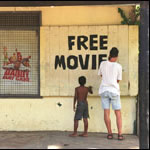Reel Paradise (Steve James)
When it comes to the hot list within the independent film community, John Pierson is the man known for his involvement in the careers of Spike Lee, Mike Smith and Richard Linklater. After moving into his own show on IFC Split Screen, he wanted to turn a page and enter the next chapter of his life.
For John, even the indie film world got as hyped up and artificial as mainstream Hollywood and he got bored with the whole scene. Looking to escape without completely cutting the film umbilical chord, he set out with his family to Fiji and the 180 Meridian Cinema, named after it’s location on the border of an international timezone, venturing into a year long journey where escapism and discovery overlapped.
Opening up the previously abandoned theater, John jumps monetary boundaries by showing independent films for free, something that brought in a whole new population from the island of Taveuni. For him, his joy was watching the people watching the movies in their own way; screaming and laughing with abandon. Where he struggles is letting go of his day to day habits that we all have, such as living by the clock. He also experiences the conflict with the religious power the Catholic Church has on the locals and their fight against his efforts. After enduring their conspiracy tactics and falsely created rumors to taint his name, he not observes them as hypocrites and vows to never speak to another priest or nun ever again.
Initially his wife Janet was reluctant, coming from a New Yorker lifestyle and being used to having something as expected as Internet access. Not soon after arrival she actually acclimates to the easy going nature of Taveuni’s people, integrating herself into their society and realizing that her initial reaction to their lifestyle as living in poverty was quite the opposite. They have everything they need by fishing and cooking in the way that’s worked for them for hundreds of years; it just differs from our more modern ways.
Their two children, Georgia and Wyatt, also embrace the people of Fiji by befriending their schoolmates at a Catholic High School. More time is spent on Georgia as she stretches her teenage muscles, defying her parents on a continual basis and receiving increased attention as an American girl. But she shows one moment of clarity, realizing this world outside of her own by comparing where she was living to that of her friends who know of nothing beyond the mall and getting their nails done.
Over dinner Wyatt debates his father’s movie choices with a level of confidence closer to one of John’s equals as opposed to the role of a son. Towards the end of their year he contemplates their time in Fiji and how his father may have read the books on this country’s culture, but did little to absorb it, either by learning the language or getting involved to the level that others did in the family.
Reel Paradise not only delves into the dynamic of today’s American family, but how American’s themselves are able to adjust their habits and expectations to more foreign ways of life and learn from them.
The last part of the triangle is the discovery of how movies impact any culture and its people. Janet brought this to light with her belief that movies are a form of group hypnosis, where people sit in the dark with all their attention focused on the screen and are affected by the images and experiences they see, hear and feel.

